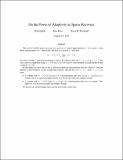| dc.contributor.author | Indyk, Piotr | |
| dc.contributor.author | Price, Eric C. | |
| dc.contributor.author | Woodruff, David P. | |
| dc.date.accessioned | 2012-09-17T17:45:48Z | |
| dc.date.available | 2012-09-17T17:45:48Z | |
| dc.date.issued | 2011-12 | |
| dc.date.submitted | 2011-10 | |
| dc.identifier.isbn | 978-1-4577-1843-4 | |
| dc.identifier.issn | 0272-5428 | |
| dc.identifier.uri | http://hdl.handle.net/1721.1/73010 | |
| dc.description.abstract | The goal of (stable) sparse recovery is to recover a k-sparse approximation x* of a vector x from linear measurements of x. Specifically, the goal is to recover x* such that ∥x-x*∥[subscript p] ≤ C min, k-sparse x, ∥x-x'∥[subscript q] for some constant C and norm parameters p and q. It is known that, for p = q=l or p = q = 2, this task can be accomplished using m = O(k log(n/k)) non-adaptive measurements [3] and that this bound is tight [9], [12], [28]. In this paper we show that if one is allowed to perform measurements that are adaptive, then the number of measurements can be considerably reduced. Specifically, for C = 1+∈ and p = q = 2 we show · A scheme with m= O(1/∈ log log (n∈/k)) measurements that uses O(log* k · log log(n∈/k)) rounds. This is a significant improvement over the best possible non-adaptive bound. · A scheme with m = O(1/∈k log(k/∈) + k log(n/k)) measurements that uses two rounds. This improves over the best possible non-adaptive bound. To the best of our knowledge, these are the first results of this type. | en_US |
| dc.description.sponsorship | Space and Naval Warfare Systems Center San Diego (U.S.) (Contract N66001-11-C-4092) | en_US |
| dc.description.sponsorship | David & Lucile Packard Foundation (Fellowship) | en_US |
| dc.language.iso | en_US | |
| dc.publisher | Institute of Electrical and Electronics Engineers (IEEE) | en_US |
| dc.relation.isversionof | http://dx.doi.org/10.1109/focs.2011.83 | en_US |
| dc.rights | Creative Commons Attribution-Noncommercial-Share Alike 3.0 | en_US |
| dc.rights.uri | http://creativecommons.org/licenses/by-nc-sa/3.0/ | en_US |
| dc.source | Other Repository | en_US |
| dc.title | On the Power of Adaptivity in Sparse Recovery | en_US |
| dc.type | Article | en_US |
| dc.identifier.citation | Indyk, Piotr, Eric Price, and David P. Woodruff. “On the Power of Adaptivity in Sparse Recovery.” IEEE 52nd Annual Symposium on Foundations of Computer Science (FOCS), 2011. 285–294. | en_US |
| dc.contributor.department | Massachusetts Institute of Technology. Computer Science and Artificial Intelligence Laboratory | en_US |
| dc.contributor.department | Massachusetts Institute of Technology. Department of Electrical Engineering and Computer Science | en_US |
| dc.contributor.approver | Indyk, Piotr | |
| dc.contributor.mitauthor | Indyk, Piotr | |
| dc.contributor.mitauthor | Price, Eric C. | |
| dc.relation.journal | IEEE 52nd Annual Symposium on Foundations of Computer Science (FOCS), 2011 | en_US |
| dc.eprint.version | Author's final manuscript | en_US |
| dc.type.uri | http://purl.org/eprint/type/ConferencePaper | en_US |
| dspace.orderedauthors | Indyk, Piotr; Price, Eric; Woodruff, David P. | en |
| dc.identifier.orcid | https://orcid.org/0000-0002-7983-9524 | |
| mit.license | OPEN_ACCESS_POLICY | en_US |
| mit.metadata.status | Complete | |
